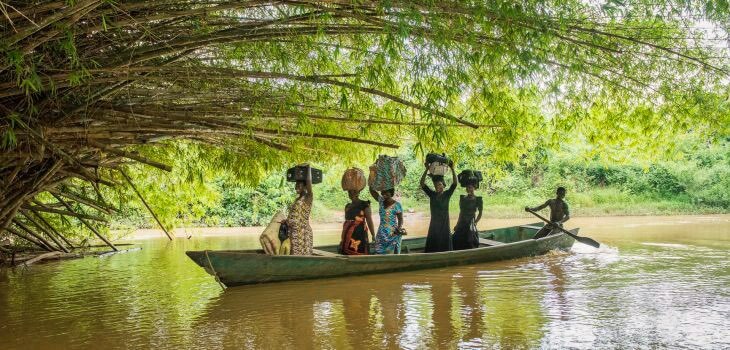The Serendipalm story began in late 2006 when Dr. Bronner’s was looking for a source of fair trade and organic palm oil. Dr. Bronner’s uses organic palm oil—or palm fruit oil to be more precise—for its bar soaps, to lend them hardness and keep them from dissolving too quickly. Since there was no credible source of fair trade palm oil anywhere in the world, in 2007 Dr. Bronner’s partnered with the NGO Fearless Planet in Ghana to set up its own fair and organic palm oil project close to the small town of Asuom. With a population of around 10,000 people, Asuom is in the Kwaebibirem Municipality of Ghana’s Eastern Region, about 100 miles (160 km) northwest of Accra. Smallholder farmers have been growing oil palms, cacao, citrus, maize, and cassava there since the 1970s. The area also had the infrastructure for palm oil processing. There are numerous small mills that produce oil for the domestic food market using rustic methods. There is also the large Ghana Oil Palm Development Company (GOPDC) with plantations, large-scale processing and some purchasing from smallholder farmers. Both served as a comparison for us.
We started our recruitment drive by persuading a group of 200 smallholder farmers to switch to organic cultivation. We employed four agricultural technicians and established the Internal Control System (ICS) required for organic and fair trade certification. In parallel, we built a small processing plant; it began commercial production and export in 2009.
The original local management was not able to cope with the expansion and the increasing number of farmers and employees, so we gradually built up a professional management team. Today there are about 20 very motivated professionals responsible for agricultural science, accounting, HR management and engineering. The fact that they moved from the cities of Accra and Kumasi to the countryside, where they enjoy their roles at the facility and in the community, shows that the predominant rural exodus of professionals can be reversed by offering meaningful, purposeful work in the countryside. Serendipalm’s success with the production and sale of palm oil to committed companies like Dr. Bronner’s, Rapunzel and GEPA, along with our growing local impact, shows that responsibly run agricultural trade and processing can be at the heart of sustainable rural development. The key has been getting small farmers to switch to more sustainable and more profitable cultivation, running a business with vision, creating a good working atmosphere, partnering with customers who share our vision, and completing fair trade development projects that motivate the larger local community.
What does Serendipalm’s future hold?
Serendipalm’s success to date has inspired us to develop new ideas for further expansion of the project. We are optimizing our production facility to improve efficiency, notably oil yield, and expand output to approximately 1,000 metric tons per year of palm oil, allowing us to meet growing demand. In 2013, we began helping our oil palm farmers, many of whom also grow cocoa conventionally, to shift to organic production of cocoa. These farmers often can’t make money growing cocoa, despite their heavy use of pesticides. Our goal is to make cocoa profitable for them by improving bean yields through better care of their orchards, including pruning and thinning of trees. Currently, over 300 cocoa farmers are members of our ICS and we continue to add farmers, including over 500 from an affiliated cooperative in the Kumasi area.
We are actively implementing and promoting the concept of mixed multi-strata (dynamic) agroforestry, taking inspiration from pioneers in this practice. Dynamic agroforestry increases biodiversity and overall yields regenerate the soil and sequester atmospheric CO2. We now operate two commercial farms in the Asuom area that demonstrate the principles of dynamic agroforestry. With European grants, we will, by 2022 train over 1,000 farmers and farmworkers in the installation and operation of dynamic agroforestry plots.
One important social project underway is the construction of an education and meeting campus in Asuom that includes a Montessori preschool for about 150 children. Most of the kids served by the school are the children and grandchildren of our production and professional staff, but the school is also open to other children in Asuom.
Since 2010, Serendipalm has hosted growing numbers of visitors: customers, fair trade organizations, interns and NGOs active in rural development. We have also expanded our farmer training programs. To accommodate training programs for larger groups and visitors, the campus will also include training, conference and meeting center and a guesthouse. This will help us fulfill our greatest wish: that Serendipalm may serve as an example for other firms to make their supply chain fair and regenerative.
